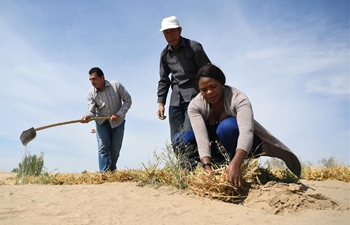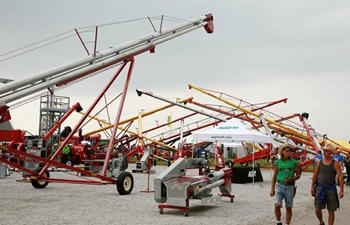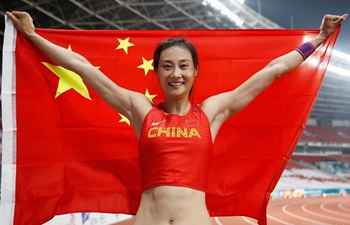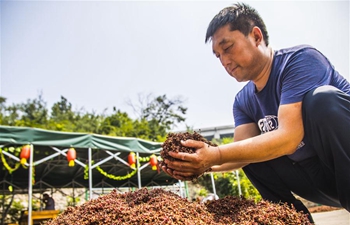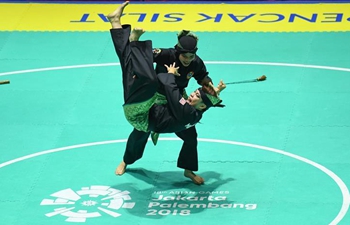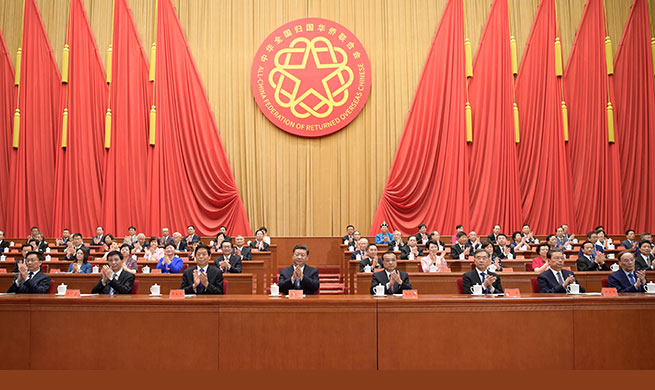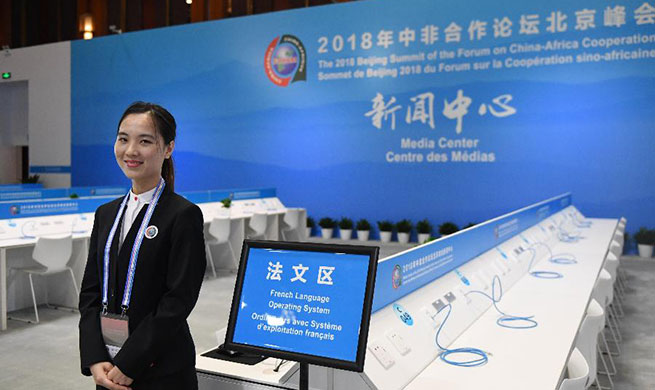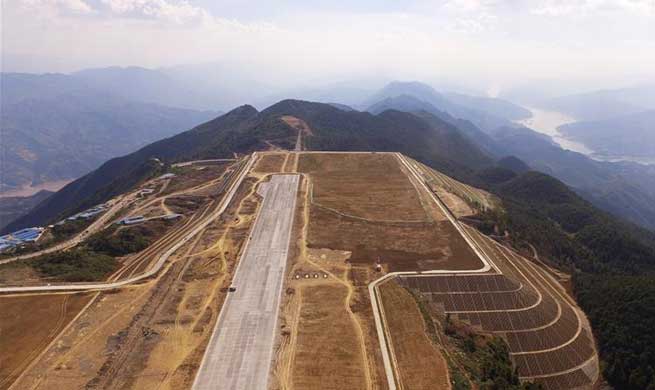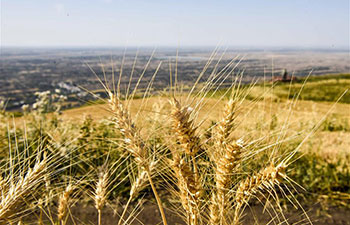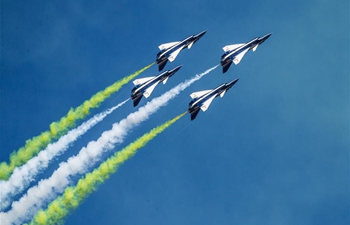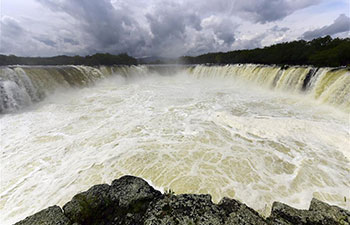by Julia Pierrepont III
LOS ANGELES, Aug. 29 (Xinhua) -- Under wispy willows beside a rippling, rock-rimmed lake, VIPs gathered on Tuesday at one of the decorative pagodas that dot the landscape at the historic Huntington Library, Art Collections, and Botanical Gardens in Los Angeles County to participate in a "Golden Shovel" ground-breaking ceremony to launch the Phase 2 expansion of their Chinese "Garden of Flowing Fragrances (Liu Fang Yuan)."
"Today marks another major milestone in our collective journey, as this next phase will triple the size of the Chinese Gardens at the Huntington," Steve Hindle, interim president of the institution, informed the attentive crowd.
In attendance at the special ceremony were Huntington trustees and donors, Library officials, and American and Chinese dignitaries.
Hindle said the Phase 2 expansion, designed by China's Suzhou Institute for Landscape Architecture and Design, would include an art studio and gallery to display Asian paintings and calligraphy; a new larger cafe with outdoor seating; and a streamside pavilion with scenic views; a courtyard of miniature landscapes; an improved "Court of Assembled Worthies,"; and a Chinese medicinal garden.
Two of the major donors, Joseph and Helen Koo, told Xinhua, "We saw the plans for the Garden and they still needed an Orchid Pavilion."
"My husband loves orchids, so we found ourselves getting involved. Then more involved. And more involved," laughed Ms. Helen Koo.
There will also be a stargazing tower pavilion with a scenic view of the Mt. Wilson Observatory and a bigger event space for larger gatherings that could generate significant revenue for the Huntington as a special event venue.
"Community support has been incredible," Sian Leong Adams, a valued member of the donor relations team, told Xinhua. "We truly couldn't have done any of this without the unflagging support of our generous donors."
James Folsom, direct of the Botanical Gardens of the Huntington, credited with initiating the idea of building a Chinese Garden at the Huntington, told Xinhua that it all began with the realization that many of the flowers Americans think of as the very heart of American horticulture actually originated in China.
"Day lilies, spirea, wisteria, camelias, forsythia, even some varieties of roses, all came from China," he said. "Also, China has a 2000 to 3000-year history of cultivating plants in a culture where living in harmony with plants and one's natural surroundings is a core aspect of their lives. We wanted to celebrate that."
And with Southern California boasting the largest population of Chinese outside of China, with over 300,000 living in the San Gabriel Valley area alone, the Huntington was the Chinese Garden's natural home.
What followed was a long and winding journey (not unlike one of the beautiful, wandering ways that thread contentedly through the Garden of Flowing Fragrances) as the Huntington took almost two decades to develop, implement and complete Phase One of the Chinese Garden on its current, stunningly beautiful, 3.5 acres site. The Garden opened in 2008 with eight tile-roofed pavilions situated around a one-acre lake. In 2014, two new pavilions and a rock grotto were added.
But that may pale in comparison to the even more ambitious 8.5 acres plan of Phase 2 that broke ground Tuesday.
"A garden is never done. It just continues to grow and evolve. Which brings me to some of the remaining donor opportunities..." chuckled Folsom.
The next phase of the Garden is budgeted at 23 million U.S. dollars, of which 19 million dollars has already been raised, bringing the total 20-year outlay on developing the garden to 53 million dollars. The garden will remain open to visitors during construction, with the new sections anticipated to open in February 2020.
Lisa Blackburn, the Library's communications coordinator, told Xinhua, "Expanding the Chinese Garden is not just to increase the garden's footprint, but an opportunity to advance interpretive programming and put the garden in the cultural context that it deserves so we can enhance our understanding of Chinese culture."
"Many people in the Chinese-American community want to see their culture reflected in a powerfully relevant way - in a way that shows the rich connections between the history of China and the future of America," added Folsom.
Speaking proudly of the years of hard work that have gone into creating the Chinese Garden, interim president Hindle told Xinhua, "My own view is that the Garden of Flowing Fragrances is the jewel in the crown of the Huntington Gardens. It represents a significant opportunity for us as an institution to engage in a conversation about the significance of Chinese art and Chinese culture."
Dr. Karen Lawrence, the newly-minted, incoming president of the Huntington, heralded the Chinese Garden as an "unparalleled public platform for cultural exploration and understanding - a place where grandparents can show their grandkids something about their heritage and traditions ... and place for people of many cultural backgrounds to experience genuine Chinese culture."
The Huntington will also be expanding its educational programming through its Center for East Asian Studies, the only center of its kind in the United States. They will offer lectures, performances, artistic activities, and classes on music, literature, botany, architecture, and other cultural themes.
Chinese Consul General in Los Angeles Zhang Ping shared that his family originated in Suzhou and that he takes great pride in that cultural heritage.
"Seeing the pagodas, stone corridors, winding footpaths, lakeside rocks, rippling pond, and changing views from window to window arouses my nostalgic sentiments and the childhood memories of my numerous visits to Suzhou Gardens," he reminisced.
Zhang closed by sharing some food for thought, suggesting, "The philosophy and ideas behind the Chinese Garden still remain relevant today to the current international circumstances. While we strive for harmony between man and nature, we should not forget harmony between different countries and different cultures is of vital importance to the peace and stability of the world."
